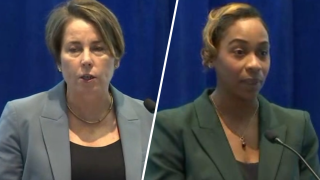
Two of the state's top elected officials are newly encouraging colleges and universities in Massachusetts to find new approaches to "advance diversity, break down barriers, and increase access for historically underrepresented groups" in light of the Supreme Court's ruling that restricted the use of race by college administrators in admissions decisions.
Gov. Maura Healey and Attorney General Andrea Campbell issued joint guidance Monday for colleges admitting new students, calling on campuses to comply with the court's ruling while still advancing diversity efforts.
The guidelines say institutions can "look beyond traditional measures such as grades" to a more "holistic view" of a person, which could include race.
Asked what this looks like in practice, Education Secretary Patrick Tutwiler said many colleges and universities have added a question to their application where a student can discuss how their race impacted their life.
"A student can talk about any sort of circumstances in their life, including race, that have helped shape who they are. It might be related to an incident, it might be related to an 'aha!' moment in their lives. Students are allowed to talk about that in or rather, colleges are allowed to ask questions about that of students. And then students are free to go the distance in talking about whatever aspect they would like to, including race," Tutwiler said.
Still, the administration's guidance warns, "Institutions may continue to collect data based on race and ethnicity, and other aspects of identity, but institutions may not provide an advantage to an individual applicant solely and specifically on the basis of the data collected about their race."
“It is simply wrong to suggest that every student in Massachusetts or in this country begins from the same baseline. They don't, that's a fact,” Healey said at an event at UMass Boston on Monday. "It is also wrong to assume America provides a level playing field for all students. It doesn't; we don't; we never have. It's also wrong to believe that colleges and universities don't need to be intentional about how we increase diversity, equity and access."



